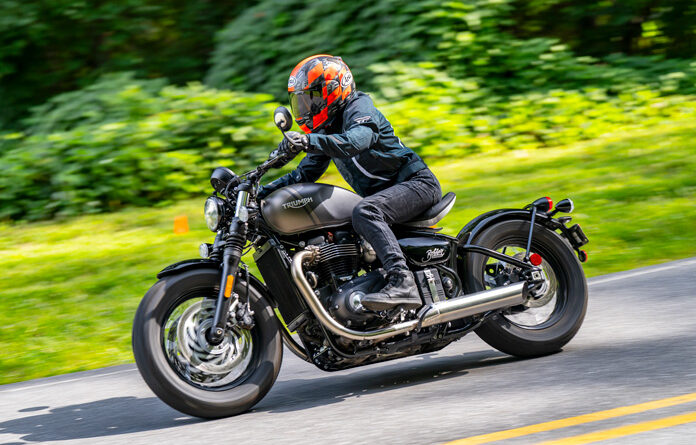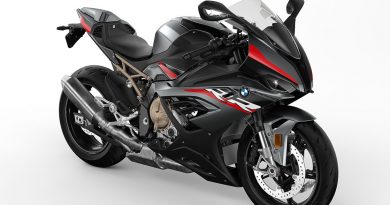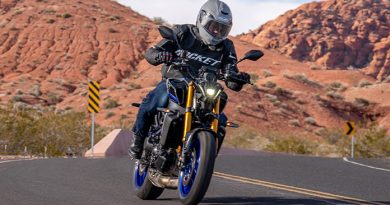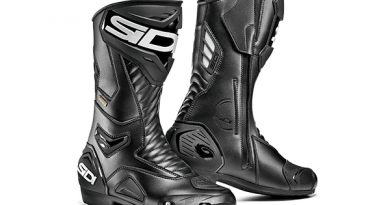2023 Triumph Bonneville Bobber Review | First Ride
The Triumph Bobber is the kind of bike that stops you in your tracks when you see it. It has the personalized look of a custom bike with the coherence and harmony of a factory model. Not long after picking up our test bike, I found out the Bobber will help you make new friends wherever you ride it.
When I see a bike that looks as cool as the Bobber, I think, Nice, but how does it ride? I wonder if the builder, or in this case the manufacturer, sacrificed attention to ride quality, comfort, or performance for the sake of appearance. Fortunately, Triumph took measures to ensure that function was not the sacrificial lamb of form.
Bare Necessities
The “bobber” style emerged in America in the 1940s. Motorcyclists stripped their rides down, threw out everything that wasn’t essential, and tuned motors for a more exciting zero-to-full-power experience. These bikes were the simple bare necessities of motorcycling, and they appealed to riders who wanted a pure motorcycling experience without anything bogging them down.
Triumph’s attempt at a bobber-styled factory bike also involved cutting down and tuning up. Although it’s not a lightweight motorcycle – claimed wet weight is 553 lbs – the stripped-down look comes in the form of well-hidden cables, a solo tractor seat, and of course, bobbed fenders. Adding to the look of an old-school bobber are the battery box wrapped in a stainless-steel strap and the twin throttle bodies that look like carburetors.
The Triumph Bobber is powered by the liquid-cooled 1,200cc parallel-Twin with 4 valves per cylinder – the same engine found in Triumph’s popular Bonneville T120 model. However, the Bobber version of the engine gets a special tune and taller gearing. Adding to the experience is a set of slash-cut exhausts that direct sound to the rider for a powerful and pleasant rumble.
When the Bobber was introduced in 2017, we were there for the press launch in Spain. Although our overall impression was positive, we noted some shortcomings. The small fuel tank had a limited range, and the single-disc front brake was mediocre. The Bobber Black remedied one issue by adding dual-disc front brakes, along with an up-spec 47mm KYB fork, a fat front wheel, and other extras. In 2021, the Bobber got an update that moved those Bobber Black components to the base model, as well as adding a larger fuel tank, LED lighting, cruise control, and new instrumentation.
Take Me Higher
My first day on the test bike would take me through the Appalachian Mountains of Georgia and North Carolina. The Bobber is easy to pick out in a parking lot, not because it’s super bright or super big (it isn’t either) but because it sits with a poise of cool confidence, ready to be admired. The solo tractor seat is a focal point of the Bobber, appearing to float above the hardtail-looking rear. Add in the blacked-out components, brushed steel slash-cut dual exhaust, chunky front tire, bar-end mirrors, and fork boots, and it’s hard to look away.
Gear Up
Helmet: Arai Regent-X
Jacket: Fly Racing Women’s Butane
Gloves: Fly Racing Brawler
Pants: Alpinestars Daisy V2 Women’s Riding Denim
Boots: Highway 21 Axle Leather Waterproof
The ergonomics of the Bobber provide a long and low riding position. The seat is adjustable fore and aft, which also changes the seat height from 27.6 inches in the forward position to 27.2 inches in the rear position. The seat is deceptively comfortable, appearing too thin to offer much support while actually providing plenty. The handlebar is a bit of a stretch for my arms, even with the seat positioned as far forward as it’ll go, but I became accustomed to the reach after a few miles, and it didn’t result in any discomfort or achiness after long hours.
Upon turning the key and starting the Bobber, the bike comes to life with a satisfying rumble befitting the Triumph name. The engine got an upgrade in 2021 with lower emissions and a lift in power at 5,500 rpm. In the Bobber tune, this engine is claimed to make 76.9 hp at 6,100 rpm and 78.2 lb-ft of torque at 4,000 rpm. There’s always grunt on tap in any gear.
Upon picking the Bobber up in Atlanta, I had to wade through traffic for what felt like forever before I could get out of the city and see what it’s capable of. While my impatience grew as the pleasing rumble reached my ears and low-end torque pulled hard off the stoplight, the crazy Atlanta traffic gave me the chance to test out the brakes. As cars darted around like pinballs, I was relieved to find abundant stopping power at the ready. Dual 300mm discs up front with Brembo 2-piston calipers, paired with a 255mm rear disc and a Nissin single-piston caliper, were up to the task and shed speed quickly.
When I finally got out of the city, I headed for higher ground. The Bobber’s tall gearing and smooth delivery allowed for both relaxing and sporty riding – a great combo for someone who likes to do both. I could cruise down the two-lane country roads with my hair in the wind, or I could twist around curves through the mountains with plenty of gusto. The Bobber is easy to maneuver and handles tight turns with grace – the downside being that the pegs often meet the pavement when ridden aggressively.
Where the original Bonneville Bobber had a fuel capacity of 2.4 gallons, resulting in a frustrating number of gas stops required, the current Bobber bumps capacity up to 3.2 gallons. During my time with the bike, my average fuel consumption was 61.1 mpg, netting nearly 200 miles from full to empty.
The Bobber’s handling was an absolute pleasure – as long as the roads were smooth. When I got to a bumpy road, I discovered the first and perhaps only change I would make if I owned a Bonneville Bobber: the suspension. The monoshock with linkage at the rear didn’t soak up bumps well enough for me, and I found myself lifting up on the pegs when I saw inconsistencies in the road ahead to save my spine. My only other complaint about riding the Bobber is that speeds past 75 mph produce a strong gust of wind at my upper body and helmet, but I’ll take the excuse to stay off the highways rather than dilute the muscular attitude of the Bobber with an unsightly windshield.
K.I.S.S.
While the soul of the bobber style is stripping down to the basics, the Triumph Bonneville Bobber comes with some electronics that are simple and easy enough to use that they don’t take away from that pure motorcycling experience but rather enhance it. Two ride modes (Road and Rain) can be selected with a toggle on the right switchgear to change the throttle map. The Bobber also has cruise control, operated with a single button on the left switch. Switchable traction control and ABS are both standard.
The dash is graced by a beautiful round analog speedometer with an inset LCD screen that shows fuel level, gear indicator, and ride mode. A round button on the left switch is used to cycle through extra information, including two tripmeters, odometer, rpm, average fuel consumption, fuel range to empty, and a clock.
The 2023 Triumph Bonneville Bobber comes in four color options with a starting MSRP of $13,795. Our test bike was in the Matte Storm Grey / Matt Ironstone color with an MSRP of $14,295. For 2023 only, Triumph is also offering a Bobber Chrome Edition with chrome treatment on the gas tank.
Keeping true to the history of bobber-styled bikes, Triumph also offers a list of accessories for customization, including an ape-hanger handlebar, a diamond-stitched comfort seat, a forward-controls mounting kit, footboards, saddlebags, heated grips, a Fox rear suspension unit, and more.
I tested the Triumph Bonneville Bobber over the span of a few weeks, and it continued to grow on me during that time. When the sunlight hit the Bobber upon opening my garage door before a ride, I knew I had a fun time ahead of me. I had people sticking a thumbs-up out of car windows as I rode by and plenty of compliments about the bike at gas stops. Whenever someone asked me if it rode as good as it looked, I was pleased to be able to say, “Yes, absolutely.”
Check out more motorcycles in Rider’s 2024 Motorcycle Buyers Guide.
2023 Triumph Bonneville Bobber
Base Price: $13,795
Website: TriumphMotorcycles.com
Warranty: 2 yrs., unltd. miles
Engine Type: Liquid-cooled, parallel-Twin, SOHC w/ 4 valves per cyl.
Displacement: 1,200cc
Bore x Stroke: 97.6 x 80mm
Horsepower: 76.9 @ 6,100 rpm (factory claim)
Torque: 78.2 lb-ft @ 4,000 rpm (factory claim)
Transmission: 6-speed, cable-actuated assist wet clutch
Final Drive: Chain
Wheelbase: 59.1 in.
Rake/Trail: 24.5 deg./3.6 in.
Seat Height: 27.2-27.6 in.
Wet Weight: 553 lb
Fuel Capacity: 3.2 gal.
Fuel Consumption: 61.1 mpg
The post 2023 Triumph Bonneville Bobber Review | First Ride appeared first on Rider Magazine.




